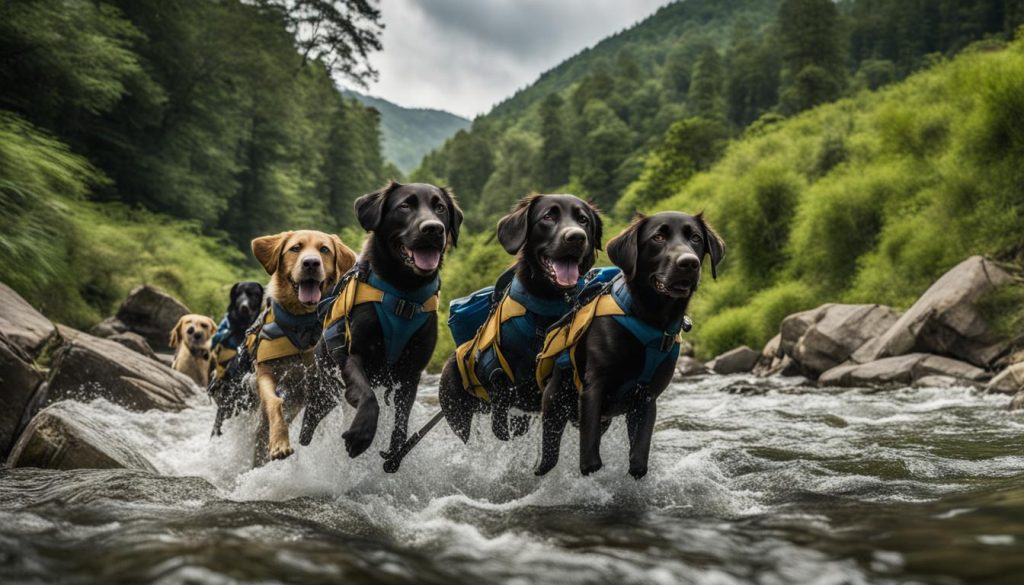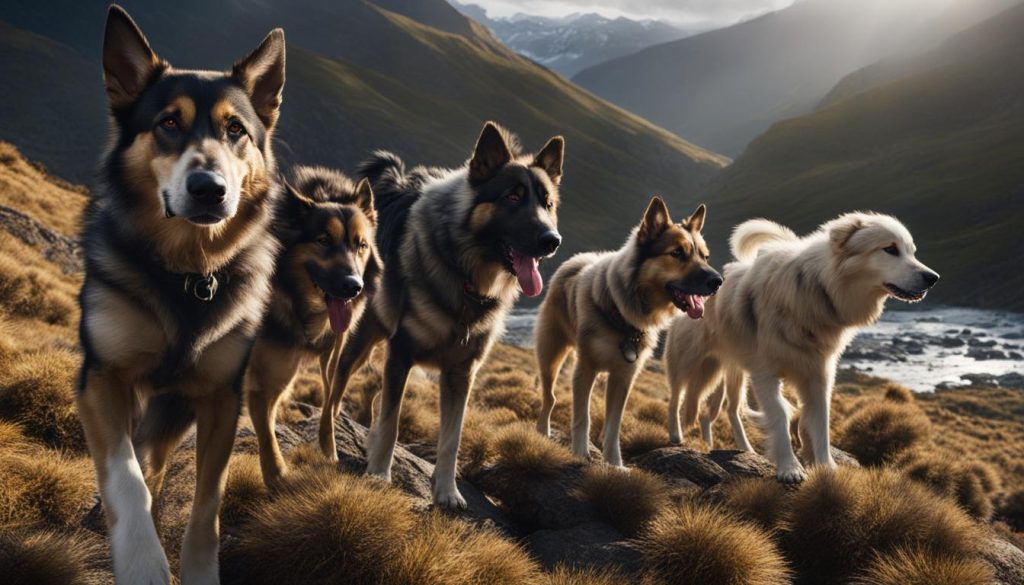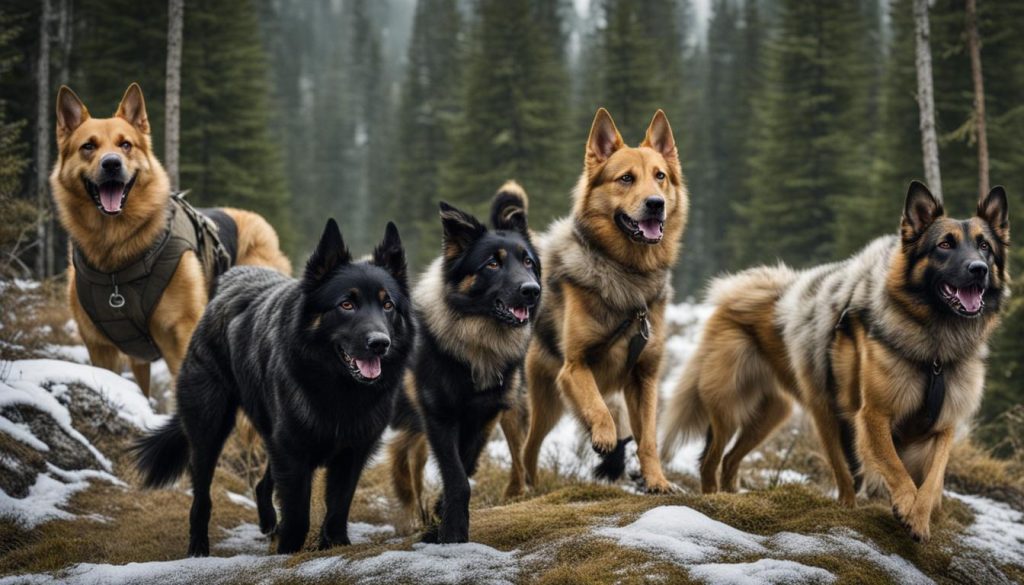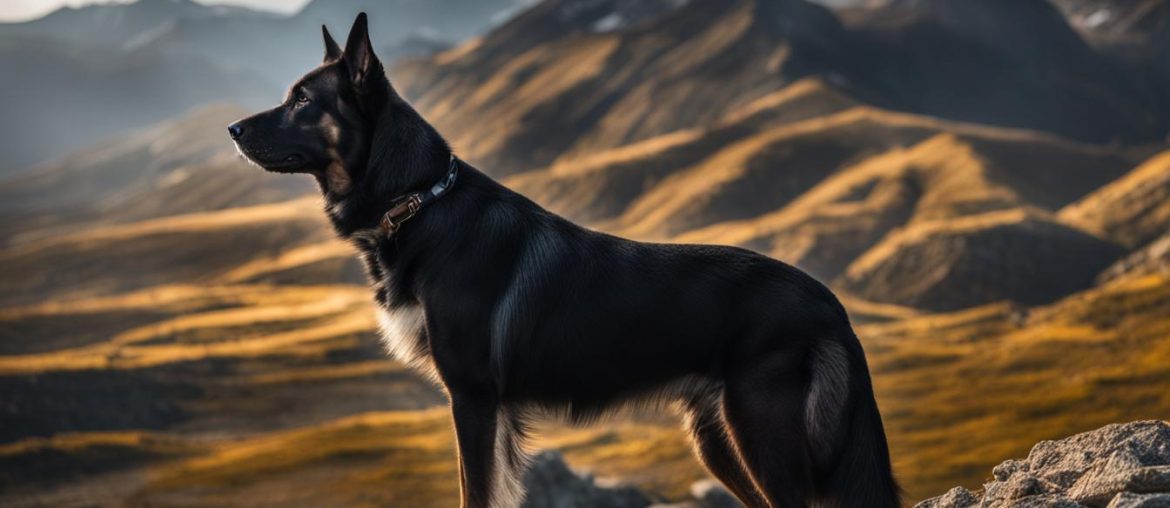When it comes to wilderness survival, having a loyal and capable companion by your side can make all the difference. But what is the best dog breed for navigating the great outdoors and facing the challenges that nature throws at you? In this article, I will explore the top dog breeds that excel in survival situations and outdoor adventures.
Key Takeaways:
- Labradors are widely regarded as one of the top dog breeds for wilderness survival due to their physical attributes, intelligence, and versatility.
- Other dog breeds like German shorthaired pointers, English springer spaniels, Chesapeake Bay retrievers, and English pointers also excel in various outdoor activities.
- When selecting a dog breed for wilderness survival, consider factors such as physical attributes, intelligence, trainability, disposition, and loyalty.
- Each dog breed suitable for wilderness survival has specific care and health considerations that must be taken into account.
- Ultimately, the best dog breed for wilderness survival will depend on the specific requirements of the survival situation, the terrain, and individual preferences.
Characteristics of Labradors for Wilderness Survival
Labradors are highly recommended for wilderness survival due to their exceptional qualities and characteristics. These dogs possess a range of physical attributes that make them well-suited for navigating various terrains and weather conditions. Labradors have a double coat, which provides warmth and water repellency, allowing them to withstand cold temperatures and wet environments. Their webbed feet enable them to swim efficiently, making water crossings and retrieving in aquatic settings much easier. The compact and muscled body of Labradors enhances their agility and endurance, enabling them to traverse challenging terrain and cover long distances.
Aside from their physical attributes, Labradors are highly intelligent and trainable dogs. They possess a pretty good ability to learn complex tasks involved in survival situations, making them adept at handling various challenges and responsibilities. Their intelligence, combined with their willingness to please their owners, renders them quick learners, which is crucial in emergency situations. Labradors are also versatile, excelling in a wide range of outdoor activities such as hunting, retrieving, and navigating difficult environments. Their adaptability and versatility make them valuable companions for wilderness survival.
Labradors also have a gentle and friendly temperament, making them suitable for families and individuals alike. Their loyalty and affectionate nature contribute to their effectiveness as outdoor survival dogs, as they remain dedicated and protective of their owners. The combination of their physical attributes, intelligence, versatility, and temperament make Labradors one of the top dog breeds for wilderness survival.

| Physical Attributes | Characteristics |
|---|---|
| Double Coat | Provides warmth and water repellency |
| Webbed Feet | Enables efficient swimming and water crossings |
| Compact, Muscled Body | Enhances agility and endurance |
Other Dog Breeds Suitable for Wilderness Survival
While Labradors are often considered the best dog breed for wilderness survival, there are several other breeds that can also excel in survival situations. These breeds possess unique characteristics that make them well-suited for the challenges of the great outdoors.
German Shorthaired Pointers
German Shorthaired Pointers are known for their stamina and exceptional nose for pointing birds, making them ideal for hunting. Their athleticism and endurance enable them to cover large areas of rugged terrain, making them valuable companions in wilderness survival scenarios.
English Springer Spaniels
English Springer Spaniels are skilled at coursing upland fields and are excellent flushers, making them valuable assets in bird hunting situations. Their ability to navigate dense cover and their enthusiasm for the hunt make them well-suited for wilderness survival.
English Setters
English Setters have a keen nose and can hold a point, making them ideal for grouse hunting. Their ability to locate and track game, coupled with their elegant and graceful appearance, make them a popular choice for wilderness survival enthusiasts.
Chesapeake Bay Retrievers
Chesapeake Bay Retrievers are known for their determination and excellent waterfowl retrieving abilities. Their thick, oily coat and webbed feet enable them to excel in water-based hunting scenarios, making them a valuable companion in outdoor survival situations.
English Pointers
English Pointers are highly energetic and have a sky-high prey drive, making them ideal for areas rich in quail. Their ability to cover ground swiftly and their relentless pursuit of game make them a versatile choice for wilderness survival.
| Breed | Main Characteristics |
|---|---|
| German Shorthaired Pointers | Stamina, exceptional nose for pointing birds |
| English Springer Spaniels | Ability to course upland fields, excellent flushers |
| English Setters | Keen nose, ability to hold a point |
| Chesapeake Bay Retrievers | Determination, excellent waterfowl retrieving abilities |
| English Pointers | High energy, sky-high prey drive |
Unique Qualities of Chesapeake Bay Retrievers for Wilderness Survival
When it comes to wilderness survival, Chesapeake Bay Retrievers stand out as a unique and exceptional breed. Their specific qualities make them well-suited for outdoor adventures and survival situations. These dogs were originally bred to navigate the cold, rough waters of the Chesapeake Bay, which developed their hard-working and utilitarian nature.
Chesapeake Bay Retrievers have a solid build and a thick, oily coat that helps them repel cold seawater. Their webbed feet make them excellent swimmers, enabling them to maneuver through water with ease. These dogs not only tolerate swimming but absolutely love it, making them highly efficient waterfowl retrievers even in icy conditions. Their mental disposition is one of determination, which makes them mentally equipped for tough tasks like sea-duck hunting.
With their unique qualities and incredible adaptability, Chesapeake Bay Retrievers are an excellent choice for wilderness survival. They excel in water-related activities and can handle harsh weather conditions with ease. Their loyalty and eagerness to please their owners make them reliable companions in the great outdoors.
The Unique Qualities of Chesapeake Bay Retrievers:
- Hard-working and utilitarian nature
- Solid build and thick, oily coat
- Webbed feet for excellent swimming
- Efficient waterfowl retrievers, even in icy conditions
- Determination and mental resilience for tough tasks
Choosing a dog breed for wilderness survival requires careful consideration, and Chesapeake Bay Retrievers offer a unique set of qualities that make them an excellent choice for outdoor enthusiasts and adventure seekers. With their distinctive physical attributes, love for swimming, and mental resilience, Chesapeake Bay Retrievers are well-equipped to handle the challenges of surviving in the wild.
The Versatility of English Pointers for Wilderness Survival
English pointers are incredibly versatile dog breeds when it comes to wilderness survival. They possess a wide range of capabilities that make them well-suited for outdoor adventures and survival situations. With their sky-high prey drive and endless pursuit of feathers, English pointers are ideal for hunting birds. They work hard and fast, exhibiting a style that rivals even the most elegant setters. Whether used for all-age field trials or closer-working stock, English pointers are known for their dedication and unwavering focus on the hunt.

English pointers not only excel in hunting, but they can also make suitable family dogs with the right training and socialization. Despite their high energy levels, they can adapt well to different environments and become loyal companions for outdoor enthusiasts. However, you should remember that English pointers require regular exercise and mental stimulation to thrive. Whether in the field or as a beloved family pet, these versatile dogs offer the perfect balance of adventure and companionship.
The Athletic Abilities of English Pointers
English pointers are highly energetic dogs with exceptional athletic abilities. Their lean and muscular build allows them to cover long distances with ease, making them ideal for navigating challenging wilderness terrains. These dogs possess incredible speed and agility, enabling them to quickly traverse various landscapes. Whether it’s sprinting through open fields or scaling rugged mountains, English pointers are up for the challenge, making them one of the top dog breeds for outdoor adventures.
The Intelligence and Trainability of English Pointers
Another significant characteristic of English pointers is their intelligence and trainability. These dogs are highly intelligent and quick learners, allowing them to grasp training at a younger age and handle complex tasks involved in survival situations. Their sharp minds and eagerness to please make them ideal candidates for obedience training and mastering intricate commands. The combination of their intelligence, athleticism, and versatility makes English pointers an excellent choice for those seeking a dog breed that excels in wilderness survival scenarios.
The Adaptability of Beagles for Wilderness Survival
When it comes to dog breeds suitable for wilderness survival, one cannot overlook the adaptability of Beagles. With their exceptional scenting abilities and energetic nature, Beagles are well-suited for tracking and chasing small game, making them excellent companions for outdoor adventures. These adaptable dogs have one of the best noses in the canine world, allowing them to follow scents with speed and agility.
Beagles are known for their versatility, making them suitable for both urban and suburban environments. They don’t require a large house or yard, which means they can thrive in various living situations. Their small to medium size also makes them easy to handle and transport during wilderness expeditions.
With their energetic and characterful demeanor, Beagles are not only great wilderness companions but also make excellent family pets. They are known for their friendly and sociable nature, which makes them ideal for households with children and other pets. However, I would advise that you provide them with regular exercise and mental stimulation to keep them happy and healthy.
Key Features of Beagles for Wilderness Survival:
- Exceptional scenting abilities for tracking and chasing small game
- Adaptability to different environments, including urban and suburban areas
- Small to medium size for easy handling and transport during expeditions
- Friendly and sociable nature, suitable for families with children and other pets
Overall, Beagles are highly adaptable dog breeds that can excel in wilderness survival situations. Their scenting abilities, energetic nature, and sociable temperament make them valuable companions for outdoor adventures and family life alike.

| Breed | Physical Attributes | Intelligence and Trainability | Disposition |
|---|---|---|---|
| Labrador | Double coat, webbed feet, compact body | Highly intelligent and trainable | Loyal and dedicated |
| German Shorthaired Pointer | Stamina and nose for pointing birds | Quick learners | Hardworking and loyal |
| English Springer Spaniel | Courses upland fields, excellent flusher | Quick learners | Hardworking and loyal |
| English Setter | Keen nose, holds a point | Quick learners | Hardworking and loyal |
| Chesapeake Bay Retriever | Thick, oily coat, webbed feet | Quick learners | Determined and hardworking |
Care Requirements for Dog Breeds Suitable for Wilderness Survival
When it comes to caring for dog breeds suitable for wilderness survival, there are specific requirements that owners must fulfill to ensure their well-being in outdoor environments. These dogs have unique needs that go beyond typical household pets, and understanding their care requirements is crucial.
Physical Maintenance
One important aspect of caring for these dogs is maintaining their physical well-being. For breeds with double coats like Labradors and Chesapeake Bay retrievers, regular grooming is essential to prevent matting and keep their coats in optimal condition. This includes brushing to remove dirt, debris, and loose fur, as well as checking for any signs of skin irritation or parasites.
Exercise and Mental Stimulation
Another crucial aspect of caring for wilderness survival dog breeds is providing them with ample exercise and mental stimulation. These dogs are energetic and require regular physical activity to stay healthy and happy. Long walks, runs, and playtime in open spaces are beneficial for their physical and mental well-being. Additionally, providing them with puzzle toys, obedience training, and engaging in activities that mimic natural hunting and tracking instincts can help keep their minds stimulated.
Nutrition and Hydration
Proper nutrition and hydration are also vital for the care of these dogs. High-quality dog food that meets their nutritional needs should be provided, taking into consideration their age, size, and activity level. Fresh water should always be available for them to stay hydrated, especially during outdoor adventures where they may exert themselves more than usual.
| Physical Maintenance | Exercise and Mental Stimulation | Nutrition and Hydration |
|---|---|---|
| Regular grooming for dogs with double coats | Adequate exercise to keep them physically fit | High-quality dog food and fresh water |
| Brushing to prevent matting and skin issues | Engaging in activities that stimulate their natural instincts | Consideration of age, size, and activity level for proper nutrition |
| Checking for signs of skin irritation and parasites | Puzzle toys and obedience training for mental stimulation | Providing fresh water at all times, especially during outdoor activities |
By meeting these care requirements, owners can ensure that their dog breeds suitable for wilderness survival are well-equipped to thrive in outdoor environments. Proper physical maintenance, ample exercise and mental stimulation, and a balanced diet and hydration are all essential components of their care. As responsible pet owners, it is our duty to provide them with the care they need to lead happy and healthy lives in the wilderness.
Health Considerations for Dog Breeds Suitable for Wilderness Survival
When selecting a dog breed for wilderness survival, it is essential to consider the potential health issues that may arise. Like all dogs, breeds suitable for wilderness survival may be prone to certain health conditions. You might want to be aware of these conditions and take necessary precautions to ensure the overall well-being of your furry companion.
Common health issues in these breeds can include hip dysplasia, eye diseases, and autoimmune conditions. Each breed may also have its own specific health concerns based on their genetic predispositions and breed characteristics. For example, Labradors are prone to obesity, which can lead to various health problems, while Chesapeake Bay retrievers may be more susceptible to joint issues.
To minimize potential risks, it is essential to thoroughly research the chosen breed and purchase from reputable breeders who engage in responsible breeding practices. Regular veterinary check-ups and preventative care, such as vaccinations and flea/tick prevention, are also crucial for maintaining the overall health of these dogs. Additionally, providing a balanced diet, regular exercise, and mental stimulation are important components of a healthy lifestyle for dogs in wilderness survival situations.
| Breed | Common Health Issues |
|---|---|
| Labrador Retriever | Obesity, hip dysplasia, eye diseases |
| Chesapeake Bay Retriever | Joint issues, eye diseases |
| German Shorthaired Pointer | Hip dysplasia, ear infections |
| English Springer Spaniel | Ear infections, eye diseases |
| English Setter | Hip dysplasia, hypothyroidism |
| Beagle | Obesity, ear infections |
| English Pointer | Dermatitis, hypothyroidism |
Final Thoughts
When considering a dog breed for wilderness survival, you should prioritize the health of your canine companion. Each breed has its own unique health considerations, and being aware of these factors can help you make an informed decision. By taking the necessary precautions, providing regular veterinary care, and maintaining a healthy lifestyle, you can ensure the well-being of your dog in wilderness survival situations.

Final Thoughts
Choosing the best dog breed for wilderness survival is a crucial decision that requires careful consideration. While Labradors are widely regarded as one of the top dog breeds for this purpose, remember that different breeds have different strengths and characteristics that make them suitable for specific survival situations.
Labradors stand out due to their physical attributes, intelligence, and versatility. With their double coat for warmth, webbed feet for swimming, and compact, muscled body, they can navigate various terrains and weather conditions. Their high intelligence and trainability also make them ideal for learning complex tasks involved in survival situations.
However, other breeds like German shorthaired pointers, English springer spaniels, and Chesapeake Bay retrievers should not be overlooked. Their unique qualities and capabilities make them excellent choices for specific outdoor activities. Ultimately, the best dog breed for wilderness survival will depend on the specific requirements of the situation and individual preferences.
When deciding on the best dog breed for wilderness survival, it is essential to consider factors such as physical attributes, intelligence, trainability, disposition, loyalty, and work ethic. Thorough research and careful evaluation of breed characteristics and care requirements are crucial to ensure the chosen breed is the right fit for a wilderness survival setting. By selecting the most suitable dog breed, you can enhance your chances of success and forge a strong partnership for your outdoor adventures.
FAQ
What is the best dog breed for wilderness survival?
The best dog breed for wilderness survival depends on various factors such as the specific requirements of the survival situation, the terrain, and the individual preferences of the person.
What are the characteristics of Labradors for wilderness survival?
Labradors are widely regarded as one of the top dog breeds for wilderness survival due to their physical attributes, intelligence, and versatility in various outdoor activities.
Are there other dog breeds suitable for wilderness survival?
Yes, there are other breeds such as German shorthaired pointers, English springer spaniels, and Chesapeake Bay retrievers that excel in various outdoor activities.
What are the unique qualities of Chesapeake Bay retrievers for wilderness survival?
Chesapeake Bay retrievers have specific qualities such as a solid build, a thick, oily coat, and webbed feet that make them well-suited for wilderness survival, especially in waterfowl hunting.
How versatile are English pointers for wilderness survival?
English pointers are highly energetic, have a sky-high prey drive, and are ideal for hunting birds. They are versatile in various outdoor activities and can also make suitable family dogs with the right training and socialization.
How adaptable are Beagles for wilderness survival?
Beagles are adaptable dog breeds that excel in wilderness survival situations due to their scenting abilities and energetic nature. They are ideal companions for outdoor adventures and can track and chase small game like rabbits.
What should I consider when selecting a dog breed for wilderness survival?
Factors to consider include the breed’s physical attributes, intelligence, trainability, disposition, loyalty, and ability to work hard and please their owners.
What are the care requirements for dog breeds suitable for wilderness survival?
Care requirements can vary, but you should consider grooming needs, exercise requirements, mental stimulation, and the specific care needs of each breed.
Are there any health considerations for dog breeds suitable for wilderness survival?
Yes, like all dogs, breeds suitable for wilderness survival may be prone to certain health conditions. Common issues can include hip dysplasia, eye diseases, and autoimmune conditions. Regular veterinary check-ups and preventative care are essential.
What is the best dog breed for wilderness survival?
There is no one-size-fits-all answer. Different breeds have different strengths and characteristics. Labradors are widely regarded as one of the top dog breeds for wilderness survival, but the best breed will depend on specific requirements and individual preferences.






